
If you are ever in need, libraries and the amazing people who staff them are here to help. It is as true now as it has been for decades. From the very first public libraries in America founded in the 1700s to the ones in your neighborhood, libraries are the cornerstones of the communities they serve. The same goes for the Alachua County Library District. It is our mission to build "a better community by creating opportunities to participate, connect and discover." Our core values are: diversity of people and ideas, free and equal access, excellent and innovative service, and open exchange of ideas. Times may change, but libraries remain steadfast in serving all of their patrons and communities.
Let us look at some examples of extraordinary library services and staff in America and abroad throughout the decades. Enjoy non-fiction books about the historical good these devoted helpers did in their time as well as fictional works inspired by them.
“Look for the helpers. You will always find people who are helping.” — Mr. Rogers
Pack Horse Libraries and Bookmobiles
During the Great Depression, the American Library Association estimated that approximately a third of Americans did not have "reasonable" access to public library materials. This was particularly true in geographically isolated areas like rural Appalachian Kentucky where up to 31% of people were illiterate.
The Works Progress Administration (WPA), an agency of President Franklin D. Roosevelt's New Deal, started the Pack Horse Library initiative. This initiative sent librarians on mule and horseback deep into Appalachia to deliver books to underserved rural communities. The "book women," as the pack horse librarians were called, rode out at least twice a month, covering up to 120 miles a week. The initiative helped employ approximately 200 people and served over 100,000 residents of rural Kentucky.
After the end of the WPA projects, including the Pack Horse Library, horse-delivered books tapered off in Kentucky. Fortunately, bookmobiles were already on the road, and since 1989, Kentucky has had the most bookmobiles in the United States—73 in 2018.
The first American bookmobile, initiated by librarian Mary L. Titcomb, hit the road in 1905 at the Washington County Public Library. It was a horse-drawn carriage, followed by motorized vehicles. The Library Services Act of 1956 revived the bookmobile after the Great Depression and World War II, putting 200 new bookmobiles back on the road.
"The book goes to the man, not waiting for the man to come to the book." — Mary L. Titcomb
- Books on Horseback (and Wheels)
Non-Fiction
Image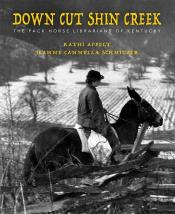
Down Cut Shin Creek: The Pack Horse Librarians of Kentucky by Kathi Appelt & Jeanne Cannella Schmitzer
It's 4:30 in the morning, and the "book woman" and her horse are already on their way. Hers is an important job, for the folks along her treacherous route are eager for the tattered books and magazines she carries in her saddlebags.
During the Great Depression, thousands lived on the brink of starvation. Many perished. In 1935 President Franklin D. Roosevelt created the Works Progress Administration under his 1933 New Deal initiative. The WPA was designed to get people back on their feet. One of its most innovative programs was the Pack Horse Library Project of Eastern Kentucky.
Thoroughly researched and illustrated with period photographs, this is the story of one of the WPA's greatest successes. People all over the country supported the project's goals. But it was the librarians themselves—young, determined, and earning just $28 a month—who brought the hope of a wider world to people in the crooks and hollows of Kentucky's Cumberland Mountains.
Image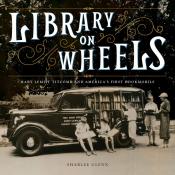
Library on Wheels: Mary Lemist Titcomb and America's First Bookmobile by Sharlee Glenn
If you can’t bring the man to the books, bring the books to the man.
Mary Lemist Titcomb (1852–1932) was always looking for ways to improve her library. As librarian at the Washington County Free Library in Maryland, Titcomb was concerned that the library was not reaching all the people it could. She was determined that everyone should have access to the library—not just adults and those who lived in town. Realizing its limitations and inability to reach the county’s 25,000 rural residents, including farmers and their families, Titcomb set about to change the library system forever with the introduction of book-deposit stations throughout the country, a children’s room in the library, and her most revolutionary idea of all—a horse-drawn Book Wagon. Soon book wagons were appearing in other parts of the country, and by 1922, the book wagon idea had received widespread support. The bookmobile was born!Fiction
Image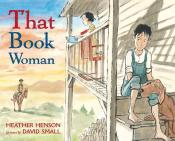
That Book Woman by Heather Henson
Cal is not the readin' type. Living way high up in the Appalachian Mountains, he'd rather help Pap plow or go out after wandering sheep than try some book learning. Nope. Cal does not want to sit stoney-still reading some chicken scratch. But that Book Woman keeps coming just the same. She comes in the rain. She comes in the snow. She comes right up the side of the mountain, and Cal knows that's not easy riding. And all just to lend his sister some books. Why, that woman must be plain foolish; or is she braver than he ever thought?
That Book Woman is a rare and moving tale that honors a special part of American history; the Pack Horse Librarians, who helped untold numbers of children see the stories amid the chicken scratch, and thus made them into lifetime readers.
Image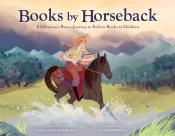
Books by Horseback: A Librarian's Brave Journey to Deliver Books to Children by Emma Carlson Berne
Deep into Appalachia, during the Great Depression food, education, and opportunities were scarce. Kentucky had fallen behind its neighboring states in electricity and highways, and the folks who lived in the craggy, mountainous region were struggling to survive. But courageous librarians were up to the challenge!
Edith, a young Pack Horse Librarian, and her faithful horse Dan, adventure through rough terrain and a pending storm in order to deliver books to kids who desperately need them in this richly illustrated tale. Edith, like all Pack Horse Librarians, heroically risked their own safety to serve the most vulnerable members of their community. Librarians like Edith helped an entire generation learn to read and gain lifesaving knowledge in a critical time in history.
Image
The Book Woman of Troublesome Creek by Kim Michele Richardson
In 1936, tucked deep into the woods of Troublesome Creek, KY, lives blue-skinned 19-year-old Cussy Carter, the last living female of the rare Blue People ancestry.
The lonely young Appalachian woman joins the historical Pack Horse Library Project of Kentucky and becomes a librarian, riding across slippery creek beds and up treacherous mountains on her faithful mule to deliver books and other reading material to the impoverished hill people of Eastern Kentucky.
Along her dangerous route, Cussy, known to the mountain folk as Bluet, confronts those suspicious of her damselfly-blue skin and the government's new book program. She befriends hardscrabble and complex fellow Kentuckians, and is fiercely determined to bring comfort and joy, instill literacy, and give to those who have nothing, a bookly respite, a fleeting retreat to faraway lands.
Image
The Giver of Stars by Jojo Moyes
Alice Wright marries handsome American Bennett Van Cleve hoping to escape her stifling life in England. But small-town Kentucky quickly proves equally claustrophobic, especially living alongside her overbearing father-in-law. So when a call goes out for a team of women to deliver books as part of Eleanor Roosevelt’s new traveling library, Alice signs on enthusiastically.
The leader, and soon Alice’s greatest ally, is Margery, a smart-talking, self-sufficient woman who’s never asked a man’s permission for anything. They will be joined by three other singular women who become known as the Packhorse Librarians of Kentucky.
What happens to them–and to the men they love–becomes an unforgettable drama of loyalty, justice, humanity and passion. These heroic women refuse to be cowed by men or by convention. And though they face all kinds of dangers in a landscape that is at times breathtakingly beautiful, at others brutal, they’re committed to their job: bringing books to people who have never had any, arming them with facts that will change their lives.
Based on a true story rooted in America’s past, The Giver of Stars is unparalleled in its scope and epic in its storytelling. Funny, heartbreaking, enthralling, it is destined to become a modern classic–a richly rewarding novel of women’s friendship, of true love, and of what happens when we reach beyond our grasp for the great beyond.
Image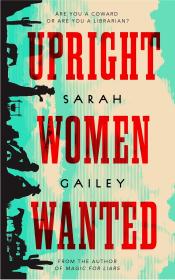
Upright Women Wanted by Sarah Gailey
“That girl’s got more wrong notions than a barn owl’s got mean looks.”
Esther is a stowaway. She’s hidden herself away in the Librarian’s book wagon in an attempt to escape the marriage her father has arranged for her—a marriage to the man who was previously engaged to her best friend. Her best friend who she was in love with. Her best friend who was just executed for possession of resistance propaganda.
The future American Southwest is full of bandits, fascists, and queer librarian spies on horseback trying to do the right thing. They'll bring the fight to you.
In Upright Women Wanted, award-winning author Sarah Gailey reinvents the pulp Western with an explicitly antifascist, near-future story of queer identity.
Image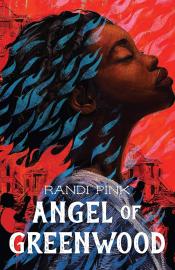
Angel of Greenwood by Randi Pink
A historical YA novel that takes place during the Greenwood Massacre of 1921, in an area of Tulsa, OK, known as the Black Wall Street.
Seventeen-year-old Isaiah Wilson is, on the surface, a town troublemaker, but is hiding that he is an avid reader and secret poet, never leaving home without his journal. A passionate follower of WEB. Du Bois, he believes that black people should rise up to claim their place as equals.
Sixteen-year-old Angel Hill is a loner, mostly disregarded by her peers as a goody-goody. Her father is dying, and her family’s financial situation is in turmoil. Also, as a loyal follower of Booker T. Washington, she believes, through education and tolerance, that black people should rise slowly and without forced conflict.
Though they’ve attended the same schools, Isaiah never noticed Angel as anything but a dorky, Bible toting church girl. Then their English teacher offers them a job on her mobile library, a three-wheel, two-seater bike. Angel can’t turn down the money and Isaiah is soon eager to be in such close quarters with Angel every afternoon.
But life changes on May 31, 1921 when a vicious white mob storms the community of Greenwood, leaving the town destroyed and thousands of residents displaced. Only then, Isaiah, Angel, and their peers realize who their real enemies are.
Image
Wish on All the Stars by Lisa Schroeder
Juliet is now an official member of the Starry Beach Club, and loves working with her new friends, Emma and Carmen, to make people's wishes come true. Living away from her dad is still hard, and she misses her best friend from her old town, but she has her friends and the bookmobile, and San Diego feels more like home than ever. But then she learns that the bookmobile is going to have to shut down. The owner of the parking lot wants to start charging rent, and soon the bookmobile won't be able to stay in business. The Starry Beach Club comes up with different ways to save their favorite store, but none seem to work. But then Emma gets the idea to have a crafts fair...and she wants Juliet to sell her paintings! Juliet is nervous, and isn't sure whether she's ready to put herself on display. Meanwhile, Carmen is feeling anxious about the possibility of her mother being deported. Will Juliet be able to be brave for herself and for Carmen?
Books on the Move Around the World
Image
Biblioburro: A True Story from Colombia by Jeanette Winter
Luis loves to read, but soon his house in Colombia is so full of books there's barely room for the family. What to do? Then he comes up with the perfect solution—a traveling library! He buys two donkeys—Alfa and Beto—and travels with them throughout the land, bringing books and reading to the children in faraway villages. Beautiful!
Complete with an author's note about the real man on whom this story is based.
Image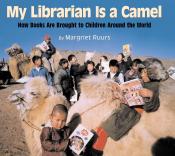
My Librarian Is a Camel: How Books Are Brought to Children Around the World by Margriet Ruurs
Do you get books from a public library in your town or even in your school library? In many remote areas of the world, there are no library buildings. In many countries, books are delivered in unusual way: by bus, boat, elephant, donkey, train, even by wheelbarrow. Why would librarians go to the trouble of packing books on the backs of elephants or driving miles to deliver books by bus? Because, as one librarian in Azerbaijan says, "Books are as important to us as air or water!" This is the intriguing photo essay, a celebration of books, readers, and libraries.
Image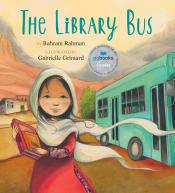
The Library Bus by Bahram Rahman
It is still dark in Kabul, Afghanistan when the library bus rumbles out of the city. There are no bus seats—instead there are chairs and tables and shelves of books. And there are no passengers—instead there is Pari, who is nervously starting her first day as Mama's library helper. Pari stands tall to hand out notebooks and pencils at the villages and the refugee camp, but she feels intimidated. The girls they visit are learning to write English from Mama. Pari can't even read or write in Farsi yet. But next year she will go to school and learn all there is to know. And that is a wonderful thing. Not long ago, Mama tells her, girls were not allowed to read at all.
Books in War
Libraries and the librarians who staffed them were key in boosting American soldiers' morale during World Wars I and II. Libraries encouraged donations of books to send to soldiers abroad. The American Library Association and others helped collect over 10 million books during WWI and more than 17 million in WWII. Libraries were established in hospitals and military bases, and the books helped ease soldiers' homesickness and boredom. Technical books also provided job training for soldiers in preparation for their return home.
During WWII, the US government was limited in its ability to gather foreign intelligence. In 1941, the Office of Strategic Services (OSS)—a precursor to the CIA—was built to address the need to collect and analyze publications and documents. The experts they called upon included spies, scholars, and librarians. Throughout the war, they gathered enemy publications in Stockholm and Lisbon, searched for records in Paris and Berlin, seized Nazi works from bookstores and schools, and discovered millions of books hidden in German caves and salt mines. Some recovered records and films were used as evidence of war crimes during the Nuremberg Trials. These information hunters aided the war effort and laid the groundwork for the expansion of American research libraries and the emergence of modern information science.
"No man and no force can take from the world the books that embody man's eternal fight against tyranny. In this war, we know, books are weapons." — President Franklin D. Roosevelt
- When Books Go To War
Non-Fiction
Image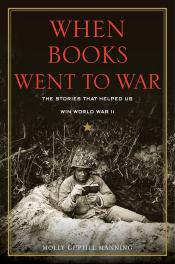
When Books Went to War: The Stories that Helped Us Win World War II by Molly Guptill Manning
When America entered World War II in 1941, we faced an enemy that had banned and burned over 100 million books and caused fearful citizens to hide or destroy many more. Outraged librarians launched a campaign to send free books to American troops and gathered 20 million hardcover donations. In 1943, the War Department and the publishing industry stepped in with an extraordinary program: 120 million small, lightweight paperbacks, for troops to carry in their pockets and their rucksacks, in every theater of war.
Comprising 1,200 different titles of every imaginable type, these paperbacks were beloved by the troops and are still fondly remembered today. Soldiers read them while waiting to land at Normandy; in hellish trenches in the midst of battles in the Pacific; in field hospitals; and on long bombing flights. They wrote to the authors, many of whom responded to every letter. They helped rescue The Great Gatsby from obscurity. They made Betty Smith, author of A Tree Grows in Brooklyn, into a national icon. When Books Went to War is an inspiring story for history buffs and book lovers alike.
Image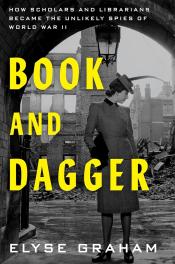
The riveting, untold story of the scholars, librarians, and university professors who were recruited as spies during WWII and helped turn the tide of the war
At the start of WWII, the US found itself in desperate need of an intelligence agency. The Office of Strategic Services (OSS), a precursor to today’s CIA, was quickly formed—and, in an effort to fill its ranks with experts, the OSS turned to academia for recruits. Suddenly, literature professors, librarians, and historians were training to perform undercover operations and investigative work—and these surprising spies would go on to profoundly shape both the course of the war and our cultural institutions with their efforts.
In Book and Dagger, Elyse Graham draws on personal histories, diaries, and declassified OSS files to tell the story of a small but connected group of humanities scholars turned unlikely spies. Among them are Joseph Curtiss, a literature professor who hunted down German spies and turned them into double agents; Sherman Kent, a smart-mouthed history professor who rose to become the head of analysis for all of Europe and Africa; and Adele Kibre, an archivist who was sent to Stockholm to secretly acquire documents for the OSS. These unforgettable characters would ultimately help lay the foundations of modern intelligence and transform American higher education when they returned after the war.
Thrillingly paced and rigorously researched, Book and Dagger is an inspiring and gripping true story about a group of academics who helped beat the Nazis—a tale that reveals the indelible power of humanities to change the world.Fiction
Image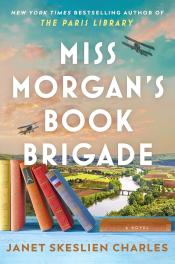
Miss Morgan's Book Brigade by Janet Skeslien Charles
1918: As the Great War rages, Jessie Carson takes a leave of absence from the New York Public Library to work for the American Committee for Devastated France. Founded by millionaire Anne Morgan, this group of international women help rebuild devastated French communities just miles from the front. Upon arrival, Jessie strives to establish something that the French have never seen—children’s libraries. She turns ambulances into bookmobiles and trains the first French female librarians. Then she disappears.
1987: When NYPL librarian and aspiring writer Wendy Peterson stumbles across a passing reference to Jessie Carson in the archives, she becomes consumed with learning her fate. In her obsessive research, she discovers that she and the elusive librarian have more in common than their work at New York’s famed library, but she has no idea their paths will converge in surprising ways across time.
Image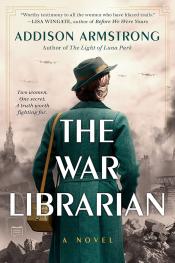
The War Librarian by Addison Armstrong
The Paris Library meets The Flight Girls in this captivating historical novel about the sacrifice and courage necessary to live a life of honor, inspired by the first female volunteer librarians during World War I and the first women accepted into the U.S. Naval Academy.
Two women. One secret. A truth worth fighting for.
1918. Timid and shy Emmaline Balakin lives more in books than her own life. That is, until an envelope crosses her desk at the Dead Letter Office bearing a name from her past, and Emmaline decides to finally embark on an adventure of her own--as a volunteer librarian on the frontlines in France. But when a romance blooms as she secretly participates in a book club for censored books, Emmaline will need to find more courage within herself than she ever thought possible in order to survive.
1976. Kathleen Carre is eager to prove to herself and to her nana that she deserves her acceptance into the first coed class at the United States Naval Academy. But not everyone wants female midshipmen at the Academy, and after tragedy strikes close to home, Kathleen becomes a target. To protect herself, Kathleen must learn to trust others even as she discovers a secret that could be her undoing.
Image
The Air Raid Book Club by Annie Lyons
London, 1938: The bookstore just doesn’t feel the same to Gertie Bingham ever since the death of her beloved husband Harry. Bingham Books was a dream they shared together, and without Harry, Gertie wonders if it’s time to take her faithful old lab, Hemingway, and retire to the seaside. But fate has other plans for Gertie.
In Germany, Hitler is on the rise, and Jewish families are making the heart-wrenching decision to send their children away from the growing turmoil. After a nudge from her dear friend Charles, Gertie decides to take in one of these refugees, a headstrong teenage girl named Hedy. Willful and fearless, Hedy reminds Gertie of herself at the same age, and shows her that she can’t give up just yet. With the terrible threat of war on the horizon, the world needs people like Gertie Bingham and her bookshop.
When the Blitz begins and bombs whistle overhead, Gertie and Hedy come up with the idea to start an air raid book club. Together with neighbors and bookstore customers, they hold lively discussions of everything from Winnie the Pooh to Wuthering Heights. After all, a good book can do wonders to bolster people’s spirits, even in the most trying times. But even the best book can only provide a temporary escape, and as the tragic reality of the war hits home, the book club faces unimaginable losses. They will need all the strength of their stories and the bonds they’ve formed to see them through to brighter days.
Image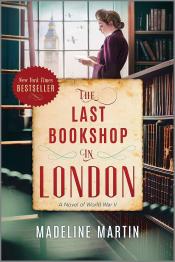
The Last Bookshop in London by Madeline Martin
August 1939: London prepares for war as Hitler’s forces sweep across Europe. Grace Bennett has always dreamed of moving to the city, but the bunkers and blackout curtains that she finds on her arrival were not what she expected. And she certainly never imagined she’d wind up working at Primrose Hill, a dusty old bookshop nestled in the heart of London.
Through blackouts and air raids as the Blitz intensifies, Grace discovers the power of storytelling to unite her community in ways she never dreamed—a force that triumphs over even the darkest nights of the war.
Image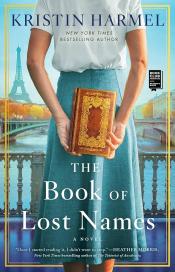
The Book of Lost Names by Kristin Harmel
Eva Traube Abrams, a semi-retired librarian in Florida, is shelving books one morning when her eyes lock on a photograph in a magazine lying open nearby. She freezes; it’s an image of a book she hasn’t seen in sixty-five years—a book she recognizes as The Book of Lost Names.
The accompanying article discusses the looting of libraries by the Nazis across Europe during World War II—an experience Eva remembers well—and the search to reunite people with the texts taken from them so long ago. The book in the photograph, an eighteenth-century religious text thought to have been taken from France in the waning days of the war, is one of the most fascinating cases. Now housed in Berlin’s Zentral- und Landesbibliothek library, it appears to contain some sort of code, but researchers don’t know where it came from—or what the code means. Only Eva holds the answer—but will she have the strength to revisit old memories and help reunite those lost during the war?
As a graduate student in 1942, Eva was forced to flee Paris after the arrest of her father, a Polish Jew. Finding refuge in a small mountain town in the Free Zone, she begins forging identity documents for Jewish children fleeing to neutral Switzerland. But erasing people comes with a price, and along with a mysterious, handsome forger named Rémy, Eva decides she must find a way to preserve the real names of the children who are too young to remember who they really are. The records they keep in The Book of Lost Names will become even more vital when the resistance cell they work for is betrayed and Rémy disappears.
Image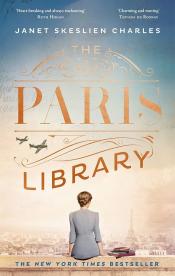
The Paris Library by Janet Skeslien Charles
Paris, 1939: Young and ambitious Odile Souchet has it all: her handsome police officer beau and a dream job at the American Library in Paris. When the Nazis march into Paris, Odile stands to lose everything she holds dear, including her beloved library. Together with her fellow librarians, Odile joins the Resistance with the best weapons she has: books. But when the war finally ends, instead of freedom, Odile tastes the bitter sting of unspeakable betrayal.
Montana, 1983: Lily is a lonely teenager looking for adventure in small-town Montana. Her interest is piqued by her solitary, elderly neighbor. As Lily uncovers more about her neighbor’s mysterious past, she finds that they share a love of language, the same longings, and the same intense jealousy, never suspecting that a dark secret from the past connects them.
A powerful novel that explores the consequences of our choices and the relationships that make us who we are—family, friends, and favorite authors—The Paris Library shows that extraordinary heroism can sometimes be found in the quietest of places.
Image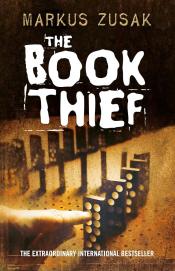
The Book Thief by Markus Zusak
It is 1939. Nazi Germany. The country is holding its breath. Death has never been busier, and will be busier still.
By her brother's graveside, Liesel's life is changed when she picks up a single object, partially hidden in the snow. It is The Gravedigger's Handbook, left behind there by accident, and it is her first act of book thievery. So begins a love affair with books and words, as Liesel, with the help of her accordian-playing foster father, learns to read. Soon she is stealing books from Nazi book-burnings, the mayor's wife's library, wherever there are books to be found.
But these are dangerous times. When Liesel's foster family hides a Jew in their basement, Liesel's world is both opened up, and closed down.
In superbly crafted writing that burns with intensity, award-winning author Markus Zusak has given us one of the most enduring stories of our time.
Image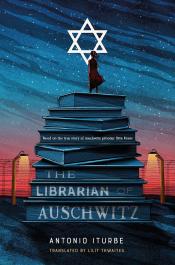
The Librarian of Auschwitz by Antonio Iturbe
Based on the experience of real-life Auschwitz prisoner Dita Kraus, this is the incredible story of a girl who risked her life to keep the magic of books alive during the Holocaust.
Fourteen-year-old Dita is one of the many imprisoned by the Nazis at Auschwitz. Taken, along with her mother and father, from the Terezín ghetto in Prague, Dita is adjusting to the constant terror that is life in the camp. When Jewish leader Freddy Hirsch asks Dita to take charge of the eight precious volumes the prisoners have managed to sneak past the guards, she agrees. And so Dita becomes the librarian of Auschwitz.
Out of one of the darkest chapters of human history comes this extraordinary story of courage and hope.
Image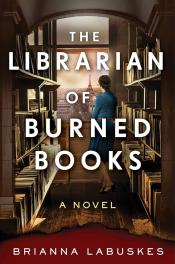
The Librarian of Burned Books by Brianna Labuskes
Berlin 1933. Following the success of her debut novel, American writer Althea James receives an invitation from Joseph Goebbels himself to participate in a culture exchange program in Germany. For a girl from a small town in Maine, 1933 Berlin seems to be sparklingly cosmopolitan, blossoming in the midst of a great change with the charismatic new chancellor at the helm. Then Althea meets a beautiful woman who promises to show her the real Berlin, and soon she's drawn into a group of resisters who make her question everything she knows about her hosts--and herself.
Paris 1936. She may have escaped Berlin for Paris, but Hannah Brecht discovers the City of Light is no refuge from the anti-Semitism and Nazi sympathizers she thought she left behind. Heartbroken and tormented by the role she played in the betrayal that destroyed her family, Hannah throws herself into her work at the German Library of Burned Books. Through the quiet power of books, she believes she can help counter the tide of fascism she sees rising across Europe and atone for her mistakes. But when a dear friend decides actions will speak louder than words, Hannah must decide what stories she is willing to live--or die--for.
New York 1944. Since her husband Edward was killed fighting the Nazis, Vivian Childs has been waging her own war: preventing a powerful senator's attempts to censor the Armed Service Editions, portable paperbacks that are shipped by the millions to soldiers overseas. Viv knows just how much they mean to the men through the letters she receives--including the last one she got from Edward. She also knows the only way to win this battle is to counter the senator's propaganda with a story of her own--at the heart of which lies the reclusive and mysterious woman tending the American Library of Nazi-Banned Books in Brooklyn.
As Viv unknowingly brings her censorship fight crashing into the secrets of the recent past, the fates of these three women will converge, changing all of them forever.
Inspired by the true story of the Council of Books in Wartime--the WWII organization founded by booksellers, publishers, librarians, and authors to use books as "weapons in the war of ideas"--The Librarian of Burned Books is an unforgettable historical novel, a haunting love story, and a testament to the beauty, power, and goodness of the written word.
Image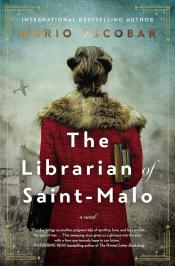
The Librarian of Saint-Malo by Mario Escobar
Libraries are being ransacked. France is torn apart by war. A French librarian is determined to resist. Told through smuggled letters to an author, an ordinary librarian describes the brutal Nazi occupation of her small coastal village and the extraordinary measures she takes to fight back.
Saint-Malo, France: August 1939. Jocelyn and Antoine are childhood sweethearts, but just after they marry, Antoine is drafted to fight against Germany. As World War II rages, Jocelyn uses her position as a librarian in her town of Saint-Malo to comfort and encourage her community with books. Jocelyn begins to write secret letters smuggled to a famous Parisian author, telling her story in the hope that it will someday reach the outside world.
France falls and the Nazis occupy Jocelyn's town, turning it into a fortress. The townspeople try passive resistance, but the German commander ruthlessly begins to destroy part of the city's libraries. Books deemed unsuitable by the Nazis are burnt or stolen, and priceless knowledge is lost.
Risking arrest and even her life, Jocelyn manages to hide some of the books while desperately waiting to receive news from her husband Antoine, now a prisoner in a German camp.
Jocelyn's mission unfolds in her letters: to protect the people of Saint-Malo and the books they hold so dear. Mario Escobar brings to life the occupied city in sweeping and romantic prose, re-creating the history of those who sacrificed all to care for the people they loved.
Image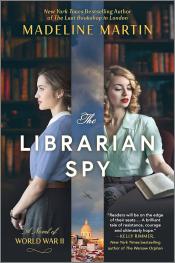
The Librarian Spy by Madeline Martin
A moving novel inspired by the true history of America’s library spies of World War II.
Ava thought her job as a librarian at the Library of Congress would mean a quiet, routine existence. But an unexpected offer from the US military has brought her to Lisbon with a new mission: posing as a librarian while working undercover as a spy gathering intelligence.
Meanwhile, in occupied France, Elaine has begun an apprenticeship at a printing press run by members of the Resistance. It’s a job usually reserved for men, but in the war, those rules have been forgotten. Yet she knows that the Nazis are searching for the press and its printer in order to silence them.
As the battle in Europe rages, Ava and Elaine find themselves connecting through coded messages and discovering hope in the face of war.
Image
The Underground Library by Jennifer Ryan
When new deputy librarian, Juliet Lansdown, finds that Bethnal Green Library isn't the bustling hub she's expecting, she becomes determined to breathe life back into it. But can she show the men in charge that a woman is up to the task of running it, especially when a confrontation with her past threatens to derail her?
Katie Upwood is thrilled to be working at the library, although she's only there until she heads off to university in the fall. But after the death of her beau on the front line and amid tumultuous family strife, she finds herself harboring a life-changing secret with no one to turn to for help.
Sofie Baumann, a young Jewish refugee, came to London on a domestic service visa only to find herself working as a maid for a man who treats her abominably. She escapes to the library every chance she can, finding friendship in the literary community and aid in finding her sister, who is still trying to flee occupied Europe.
When a slew of bombs destroy the library, Juliet relocates the stacks to the local Underground station where the city's residents shelter nightly, determined to lend out stories that will keep spirits up. But tragedy after tragedy threatens to unmoor the women and sever the ties of their community. Will Juliet, Kate, and Sofie be able to overcome their own troubles to save the library? Or will the beating heart of their neighborhood be lost forever?
Image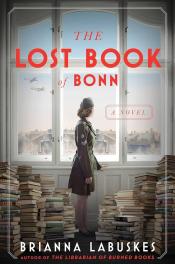
The Lost Book of Bonn by Brianna Labuskes
For fans of The Rose Code and The Librarian Spy comes another literary themed historical novel from the author of The Librarian of Burned Books. Germany, 1946: Emmy Clarke is a librarian not a soldier. But that doesn’t stop the Library of Congress from sending her overseas to Germany to help the Monuments Men retrieve and catalog precious literature that was plundered by the Nazis. The Offenbach Archival Depot and its work may get less attention than returning art to its rightful owners, but for Emmy, who sees the personalized messages on the inside of the books and the notes in margins of pages, it feels just as important. On Emmy’s first day at work, she finds a poetry collection by Rainer Maria Rilke, and on the title page is a handwritten “To Annelise, my brave Edelweiss Pirate.” Emmy is instantly intrigued by the story behind the dedication and becomes determined to figure out what happened. The hunt for the rightful owner of the book leads Emmy to two sisters, a horrific betrayal, and an extraordinary protest against the Nazis that was held in Berlin at the height of the war. Nearly a decade earlier, hundreds of brave women gathered in the streets after their Jewish husbands were detained by the Gestapo. Through freezing rain and RAF bombings, the women faced down certain death and did what so few others dared to do under the Third Reich. They said no. Emmy grapples with her own ghosts as she begins to wonder if she’s just chasing two more. What she finds instead is a powerful story of love, forgiveness, and courage that brings light to even the darkest of postwar days.
More Books in War
Image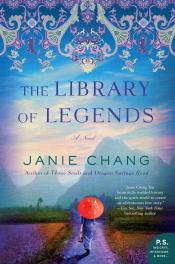
The Library of Legends by Janie Chang
“Myths are the darkest and brightest incarnations of who we are . . .”
China, 1937. When Japanese bombs begin falling on the city of Nanking, nineteen-year-old Hu Lian and her classmates at Minghua University are ordered to flee. Lian and a convoy of students, faculty and staff must walk 1,000 miles to the safety of China’s western provinces, a journey marred by the constant threat of aerial attack. And it is not just the refugees who are at risk; Lian and her classmates have been entrusted with a priceless treasure: a 500-year-old collection of myths and folklore known as the Library of Legends.
The students’ common duty to safeguard the Library of Legends creates unexpected bonds. Lian becomes friends and forms a cautious romance with the handsome and wealthy Liu Shaoming. But after one classmate is arrested and another one is murdered, Lian realizes she must escape before a family secret puts her in danger too. Accompanied by Shao and his enigmatic maidservant, Sparrow, Lian makes her way to Shanghai in the hopes of reuniting with her mother.
During the journey, Lian learns of the connection between her two companions and a tale from the Library of Legends, The Willow Star and the Prince. This revelation comes with profound consequences, for as the ancient books travel across China, they awaken immortals and guardian spirits who embark on an exodus of their own, one that will change the country’s fate forever.
Image
Love in the Library by Maggie Tokuda-Hall
Set in an internment camp where the United States cruelly detained Japanese Americans during WWII and based on true events, this moving love story finds hope in heartbreak.
To fall in love is already a gift. But to fall in love in a place like Minidoka, a place built to make people feel like they weren’t human—that was miraculous.
After the bombing of Pearl Harbor, Tama is sent to live in a War Relocation Center in the desert. All Japanese Americans from the West Coast—elderly people, children, babies—now live in prison camps like Minidoka. To be who she is has become a crime, it seems, and Tama doesn’t know when or if she will ever leave. Trying not to think of the life she once had, she works in the camp’s tiny library, taking solace in pages bursting with color and light, love and fairness. And she isn’t the only one. George waits each morning by the door, his arms piled with books checked out the day before. As their friendship grows, Tama wonders: Can anyone possibly read so much? Is she the reason George comes to the library every day? Beautifully illustrated and complete with an afterword, back matter, and a photo of the real Tama and George—the author’s grandparents—Maggie Tokuda-Hall’s elegant love story for readers of all ages sheds light on a shameful chapter of American history.
A Place for Everyone
Libraries are a safe place for everyone—people of all ages, all backgrounds, all reading levels and preferences, and more. In the library, patrons can find a quiet place to read, to learn, to study, and to find help with a myriad of topics covered by materials in our stacks. Whether you're a student, a new parent, wanting to learn a new language, curious about other cultures or life experiences, or looking for something more than books, the library is the place to go.
All free people have a right—a freedom—to read. That right is enshrined in the First Amendment of the U.S. Constitution.
“Congress shall make no law respecting an establishment of religion, or prohibiting the free exercise thereof; or abridging the freedom of speech, or of the press; or the right of the people peaceably to assemble, and to petition the Government for a redress of grievances.” — First Amendment of the U.S. Constitution passed by Congress September 25, 1789. Ratified December 15, 1791.
Libraries are, in a way, a safeguard and collection of those free voices from across the spectrum of human experience. The library is a place where free people can visit and find voices like or very unlike their own. Patrons can experience what they themselves might not experience if not for the words left on the pages of a book. It is vital to support and safeguard these stories from censorship and continue to honor and protect the right to read for all people and generations.
- Libraries, Why They Matter
Non-Fiction
Image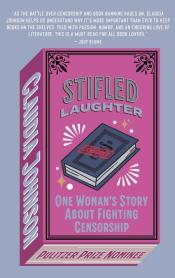
Stifled Laughter: One Woman's Story About Fighting Censorship by Claudia Johnson
Part memoir, part courtroom drama, and part primer for advocates fighting assaults on free speech, Stifled Laughter is the story of one woman's efforts to restore literary classics to the classrooms of rural north Florida. Updated with a new introduction, Johnson's honest, often hilarious, first-person account of censorship in its modern form provides valuable insight into why the books children read at school remains a controversial issue, and why free speech in America remains a precarious right. Johnson fights tirelessly to keep texts like Lysistrata and “The Millers Tale” in Florida school textbooks regardless of a preacher’s efforts to take them out. Readers are given a glimpse into the courtroom and all the drama, passion, and hard work that follows. Johnson’s writing is witty, emotional, and humorous, and it makes you want to jump in and fight censorship and book banning right alongside her. For anyone who has ever wondered just how far those who seek to ban books will go in limiting free expression, this book proves once again that the personal is political. At a time when book banning has reached new heights, parents and teachers, writers, and readers will all benefit from Johnson's experience and be touched by her spirit and courage.
Image
That Librarian: The Fight Against Book Banning in America by Amanda Jones
Part memoir, part manifesto, the inspiring story of a Louisiana librarian advocating for inclusivity on the front lines of our vicious culture wars.
One of the things small town librarian Amanda Jones values most about books is how they can affirm a young person's sense of self. So in 2022, when she caught wind of a local public hearing that would discuss “book content,” she knew what was at stake. Schools and libraries nationwide have been bombarded by demands for books with LGTBQ+ references, discussions of racism, and more to be purged from the shelves. Amanda would be damned if her community were to ban stories representing minority groups. She spoke out that night at the meeting. Days later, she woke up to a nightmare that is still ongoing. Amanda Jones has been called a groomer, a pedo, and a porn-pusher; she has faced death threats and attacks from strangers and friends alike. Her decision to support a collection of books with diverse perspectives made her a target for extremists using book banning campaigns-funded by dark money organizations and advanced by hard right politicians-in a crusade to make America more white, straight, and Christian. But Amanda Jones wouldn't give up without a she sued her harassers for defamation and urged others to join her in the resistance. Mapping the book banning crisis occurring all across the nation, That Librarian draws the battle lines in the war against equity and inclusion, calling book lovers everywhere to rise in defense of our readers.
Image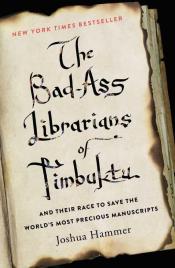
To save precious centuries-old Arabic texts from Al Qaeda, a band of librarians in Timbuktu pulls off a brazen heist worthy of Ocean’s Eleven.
In the 1980s, a young adventurer and collector for a government library, Abdel Kader Haidara, journeyed across the Sahara Desert and along the Niger River, tracking down and salvaging tens of thousands of ancient Islamic and secular manuscripts that had fallen into obscurity. The Bad-Ass Librarians of Timbuktu tells the incredible story of how Haidara, a mild-mannered archivist and historian from the legendary city of Timbuktu, later became one of the world’s greatest and most brazen smugglers.
In 2012, thousands of Al Qaeda militants from northwest Africa seized control of most of Mali, including Timbuktu. They imposed Sharia law, chopped off the hands of accused thieves, stoned to death unmarried couples, and threatened to destroy the great manuscripts. As the militants tightened their control over Timbuktu, Haidara organized a dangerous operation to sneak all 350,000 volumes out of the city to the safety of southern Mali.
Over the past twenty years, journalist Joshua Hammer visited Timbuktu numerous times and is uniquely qualified to tell the story of Haidara’s heroic and ultimately successful effort to outwit Al Qaeda and preserve Mali’s—and the world’s—literary patrimony. Hammer explores the city’s manuscript heritage and offers never-before-reported details about the militants’ march into northwest Africa. But above all, The Bad-Ass Librarians of Timbuktu is an inspiring account of the victory of art and literature over extremism.
Image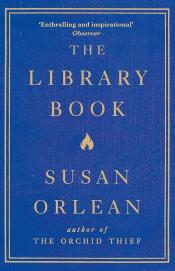
The Library Book by Susan Orlean
On the morning of April 29, 1986, a fire alarm sounded in the Los Angeles Public Library. As the moments passed, the patrons and staff who had been cleared out of the building realized this was not the usual fire alarm. As one fireman recounted, “Once that first stack got going, it was ‘Goodbye, Charlie.’” The fire was disastrous: it reached 2000 degrees and burned for more than seven hours. By the time it was extinguished, it had consumed four hundred thousand books and damaged seven hundred thousand more. Investigators descended on the scene, but more than thirty years later, the mystery remains: Did someone purposefully set fire to the library—and if so, who?
Weaving her lifelong love of books and reading into an investigation of the fire, award-winning New Yorker reporter and New York Times bestselling author Susan Orlean delivers a mesmerizing and uniquely compelling book that manages to tell the broader story of libraries and librarians in a way that has never been done before.
In The Library Book, Orlean chronicles the LAPL fire and its aftermath to showcase the larger, crucial role that libraries play in our lives; delves into the evolution of libraries across the country and around the world, from their humble beginnings as a metropolitan charitable initiative to their current status as a cornerstone of national identity; brings each department of the library to vivid life through on-the-ground reporting; studies arson and attempts to burn a copy of a book herself; reflects on her own experiences in libraries; and reexamines the case of Harry Peak, the blond-haired actor long suspected of setting fire to the LAPL more than thirty years ago.
Along the way, Orlean introduces us to an unforgettable cast of characters from libraries past and present—from Mary Foy, who in 1880 at eighteen years old was named the head of the Los Angeles Public Library at a time when men still dominated the role, to Dr. C.J.K. Jones, a pastor, citrus farmer, and polymath known as “The Human Encyclopedia” who roamed the library dispensing information; from Charles Lummis, a wildly eccentric journalist and adventurer who was determined to make the L.A. library one of the best in the world, to the current staff, who do heroic work every day to ensure that their institution remains a vital part of the city it serves.
Brimming with her signature wit, insight, compassion, and talent for deep research, The Library Book is Susan Orlean’s thrilling journey through the stacks that reveals how these beloved institutions provide much more than just books—and why they remain an essential part of the heart, mind, and soul of our country. It is also a master journalist’s reminder that, perhaps especially in the digital era, they are more necessary than ever.Fiction
Image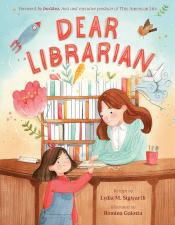
Dear Librarian by Lydia M. Sigwarth
When Lydia was five years old, she and her family had to leave their home. They hopped from Grandma's house to Aunt Linda's house to Cousin Alice's house, but no place was permanent. Then one day, everything changed. Lydia's mom took her to a new place -- not a house, but a big building with stone columns, and tall, tall steps. The library.
In the library, Lydia found her special spot across from the sunny window, at a round desk. For behind that desk was her new friend, the librarian. Together, Lydia and the librarian discovered a world beyond their walls, one that sparkled with spectacular joy.
Dear Librarian is a thank you to anyone who has offered a child love and support during a difficult time.
Image
The Loud Librarian by Jenna Beatrice
A little librarian with a larger-than-life voice finds her place in this sweet and uproarious picture book about being true to yourself—no shushing required!
Penelope is perfect for the job of student-librarian. Friendly? Check. Helpful? Check. Book lover? Check. There’s just one snag. Penelope is...LOUD. Bookcases may topple and the ground may quake at the sound of her voice, but Penelope is determined to prove she’s perfect for the job and stay true to herself. Can a little librarian with a big voice find a place where she belongs?
Image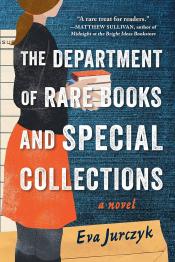
The Department of Rare Books and Special Collections by Eva Jurczyk
What holds more secrets in the library: the ancient books shelved in the stacks or the people who preserve them?
Liesl Weiss has been (mostly) happy working in the rare books department of a large university, managing details and working behind the scenes to make the head of the department look good. But when her boss has a stroke and she's left to run things, she discovers that the library's most prized manuscript is missing.
Liesl tries to sound the alarm and inform the police about the missing priceless book but is told repeatedly to keep quiet to keep the doors open and the donors happy. But then a librarian goes missing as well. Liesl must investigate both disappearances, unspooling her colleagues' pasts like the threads of a rare book binding as it becomes clear that someone in the department must be responsible for the theft. What Liesl discovers about the dusty manuscripts she has worked among for so long—and about the people who preserve and revere them—shakes the very foundation on which she has built her life.
Image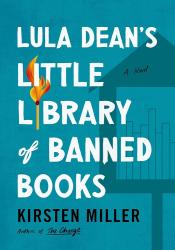
Lula Dean's Little Library of Banned Books by Kirsten Miller
The provocative and hilarious summer read that will have book lovers cheering and everyone talking! Kirsten Miller, author of The Change, brings us a bracing, wildly entertaining satire about a small Southern town, a pitched battle over banned books, and a little lending library that changes everything.
Beverly Underwood and her arch enemy, Lula Dean, live in the tiny town of Troy, Georgia, where they were born and raised. Now Beverly is on the school board, and Lula has become a local celebrity by embarking on mission to rid the public libraries of all inappropriate books—none of which she’s actually read. To replace the “pornographic” books she’s challenged at the local public library, Lula starts her own lending library in front of her home: a cute wooden hutch with glass doors and neat rows of the worthy literature that she’s sure the town’s readers need.
But Beverly’s daughter Lindsay sneaks in by night and secretly fills Lula Dean’s little free library with banned books wrapped in “wholesome” dust jackets. The Girl’s Guide to the Revolution is wrapped in the cover of The Southern Belle’s Guide to Etiquette. A jacket that belongs to Our Confederate Heroes ends up on Beloved. One by one, neighbors who borrow books from Lula Dean’s library find their lives changed in unexpected ways. Finally, one of Lula Dean’s enemies discovers the library and decides to turn the tables on her, just as Lula and Beverly are running against each other to replace the town’s disgraced mayor.
That’s when all the townspeople who’ve been borrowing from Lula’s library begin to reveal themselves. It’s a diverse and surprising bunch—including the local postman, the prom queen, housewives, a farmer, and the former DA—all of whom have been changed by what they’ve read. When Lindsay is forced to own up to what she’s done, the showdown that’s been brewing between Beverly and Lula will roil the whole town...and change it forever.
Image
The Banned Books Club by Brenda Novak
She left her hometown following a scandal—but family loyalty is dragging her back…
Despite their strained relationship, when Gia Rossi’s sister, Margot, begs her to come home to Wakefield, Iowa, to help with their ailing mother, Gia knows she has no choice. After her rebellious and at-times-tumultuous teen years, Gia left town with little reason to look back. But she knows Margot’s borne the brunt of their mother’s care and now it’s Gia’s turn to help, even if it means opening old wounds.
As expected, Gia’s homecoming is far from welcome. There’s the Banned Books Club she started after the PTA overzealously slashed the high school reading list, which is right where she left it. But there is also Mr. Hart, her former favorite teacher. The one who was fired after Gia publicly and painfully accused him of sexual misconduct. The one who prompted Gia to leave behind a very conflicted town the minute she turned eighteen. The one person she hoped never to see again.
When Margot leaves town without explanation, Gia sees the cracks in her sister’s “perfect” life for the first time and plans to offer support. But as the town, including members of the book club, takes sides between Gia and Mr. Hart, everything gets harder. Fortunately, she learns that there are people she can depend on. And by standing up for the truth, she finds love and a future in the town she thought had rejected her.
Image
Our Missing Hearts by Celeste Ng
A novel about a mother’s unbreakable love in a world consumed by fear.
Twelve-year-old Bird Gardner lives a quiet existence with his loving but broken father, a former linguist who now shelves books in a university library. Bird knows to not ask too many questions, stand out too much, or stray too far. For a decade, their lives have been governed by laws written to preserve “American culture” in the wake of years of economic instability and violence. To keep the peace and restore prosperity, the authorities are now allowed to relocate children of dissidents, especially those of Asian origin, and libraries have been forced to remove books seen as unpatriotic—including the work of Bird’s mother, Margaret, a Chinese American poet who left the family when he was nine years old.
Bird has grown up disavowing his mother and her poems; he doesn’t know her work or what happened to her, and he knows he shouldn’t wonder. But when he receives a mysterious letter containing only a cryptic drawing, he is pulled into a quest to find her. His journey will take him back to the many folktales she poured into his head as a child, through the ranks of an underground network of librarians, into the lives of the children who have been taken, and finally to New York City, where a new act of defiance may be the beginning of much-needed change.
Do you still want more books with librarians and book lovers as main or supporting cast? Here are a few more with a bit of magic sprinkled here and there.
- More Books with Library staff helpers or protagonists
- Image
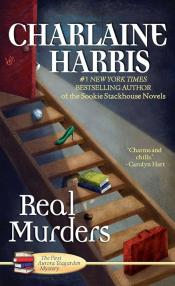
Real Murders (Aurora Teagarden #1) by Charlaine Harris
Lawrenceton, Georgia, may be a growing suburb of Atlanta, but it's still a small town at heart. Librarian Aurora "Roe" Teagarden grew up there and knows more than enough about her fellow townsfolk, including which ones share her interest in the darker side of human nature.
With those fellow crime buffs, Roe belongs to a club called Real Murders, which meets once a month to analyze famous cases. It's a harmless pastime--until the night she finds a member dead, killed in a manner that eerily resembles the crime the club was about to discuss. And as other brutal "copycat" killings follow, Roe will have to uncover the person behind the terrifying game, one that casts all the members of Real Murders, herself included, as prime suspects--or potential victims...
Image
What You Are Looking For Is In The Library by Michiko Aoyama
What are you looking for?
This is the famous question routinely asked by Tokyo’s most enigmatic librarian, Sayuri Komachi. Like most librarians, Komachi has read every book lining her shelves—but she also has the unique ability to read the souls of her library guests. For anyone who walks through her door, Komachi can sense exactly what they’re looking for in life and provide just the book recommendation they never knew they needed to help them find it.
Each visitor comes to her library from a different juncture in their careers and dreams, from the restless sales attendant who feels stuck at her job to the struggling working mother who longs to be a magazine editor. The conversation that they have with Sayuri Komachi—and the surprise book she lends each of them—will have life-altering consequences.
With heartwarming charm and wisdom, What You Are Looking For Is in the Library is a paean to the magic of libraries, friendship and community, perfect for anyone who has ever found themselves at an impasse in their life and in need of a little inspiration.
Image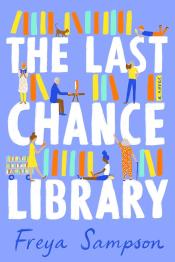
The Last Chance Library by Freya Sampson
June Jones emerges from her shell to fight for her beloved local library, and through the efforts and support of an eclectic group of library patrons, she discovers life-changing friendships along the way.
Lonely librarian June Jones has never left the sleepy English village where she grew up. Shy and reclusive, the thirty-year-old would rather spend her time buried in books than venture out into the world. But when her library is threatened with closure, June is forced to emerge from behind the shelves to save the heart of her community and the place that holds the dearest memories of her mother.
Joining a band of eccentric yet dedicated locals in a campaign to keep the library, June opens herself up to other people for the first time since her mother died. It just so happens that her old school friend Alex Chen is back in town and willing to lend a helping hand. The kindhearted lawyer's feelings for her are obvious to everyone but June, who won't believe that anyone could ever care for her in that way.
To save the place and the books that mean so much to her, June must finally make some changes to her life. For once, she's determined not to go down without a fight. And maybe, in fighting for her cherished library, June can save herself, too.
Image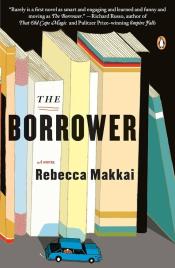
The Borrower by Rebecca Makkai
Lucy Hull, a young children's librarian in Hannibal, Missouri, finds herself both a kidnapper and kidnapped when her favorite patron, ten- year-old Ian Drake, runs away from home. The precocious Ian is addicted to reading, but needs Lucy's help to smuggle books past his overbearing mother, who has enrolled Ian in weekly antigay classes with celebrity Pastor Bob. Lucy stumbles into a moral dilemma when she finds Ian camped out in the library after hours with a knapsack of provisions and an escape plan. Desperate to save him from Pastor Bob and the Drakes, Lucy allows herself to be hijacked by Ian. The odd pair embarks on a crazy road trip from Missouri to Vermont, with ferrets, an inconvenient boyfriend, and upsetting family history thrown in their path. But is it just Ian who is running away? Who is the man who seems to be on their tail? And should Lucy be trying to save a boy from his own parents?
Image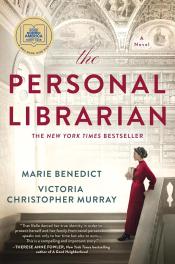
The Personal Librarian by Marie Benedict and Victoria Christopher Murray
The remarkable, little-known story of Belle da Costa Greene, J. P. Morgan's personal librarian—who became one of the most powerful women in New York despite the dangerous secret she kept in order to make her dreams come true, from New York Times bestselling author Marie Benedict and acclaimed author Victoria Christopher Murray.
In her twenties, Belle da Costa Greene is hired by J. P. Morgan to curate a collection of rare manuscripts, books, and artwork for his newly built Pierpont Morgan Library. Belle becomes a fixture on the New York society scene and one of the most powerful people in the art and book world, known for her impeccable taste and shrewd negotiating for critical works as she helps build a world-class collection.
But Belle has a secret, one she must protect at all costs. She was born not Belle da Costa Greene but Belle Marion Greener. She is the daughter of Richard Greener, the first Black graduate of Harvard and a well-known advocate for equality. Belle's complexion isn't dark because of her alleged Portuguese heritage that lets her pass as white—her complexion is dark because she is African American.
The Personal Librarian tells the story of an extraordinary woman, famous for her intellect, style, and wit, and shares the lengths to which she must go—for the protection of her family and her legacy—to preserve her carefully crafted white identity in the racist world in which she lives.
Image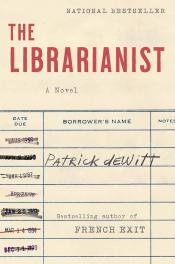
The Librarianist by Patrick deWitt
From bestselling and award-winning author Patrick deWitt comes the story of Bob Comet, a man who has lived his life through and for literature, unaware that his own experience is a poignant and affecting narrative in itself.
Bob Comet is a retired librarian passing his solitary days surrounded by books and small comforts in a mint-colored house in Portland, Oregon. One morning on his daily walk he encounters a confused elderly woman lost in a market and returns her to the senior center that is her home. Hoping to fill the void he's known since retiring, he begins volunteering at the center. Here, as a community of strange peers gathers around Bob, and following a happenstance brush with a painful complication from his past, the events of his life and the details of his character are revealed.
Behind Bob Comet's straight-man facade is the story of an unhappy child's runaway adventure during the last days of the Second World War, of true love won and stolen away, of the purpose and pride found in the librarian's vocation, and of the pleasures of a life lived to the side of the masses. Bob's experiences are imbued with melancholy but also a bright, sustained comedy; he has a talent for locating bizarre and outsize players to welcome onto the stage of his life.
With his inimitable verve, skewed humor, and compassion for the outcast, Patrick deWitt has written a wide-ranging and ambitious document of the introvert's condition. The Librarianist celebrates the extraordinary in the so-called ordinary life, and depicts beautifully the turbulence that sometimes exists beneath a surface of serenity.
Image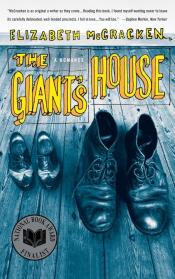
The Giant's House by Elizabeth McCracken
An unusual love story about a little librarian on Cape Cod and the tallest boy in the world, The Giant's House is the magical first novel from the author of the 1994 ALA Notable collection Here's Your Hat, What's Your Hurry.
The year is 1950, and in a small town on Cape Cod twenty-six-year-old librarian Peggy Cort feels like love and life have stood her up. Until the day James Carlson Sweatt--the "over tall" eleven-year-old boy who's the talk of the town--walks into her library and changes her life forever. Two misfits whose lonely paths cross at the circulation desk, Peggy and James are odd candidates for friendship, but nevertheless they soon find their lives entwined in ways that neither one could have predicted. In James, Peggy discovers the one person who's ever really understood her, and as he grows--six foot five at age twelve, then seven feet, then eight--so does her heart and their most singular romance.
The Giant's House is an unforgettably tender and quirky novel about learning to welcome the unexpected miracle, and about the strength of choosing to love in a world that gives no promises, and no guarantees.
Image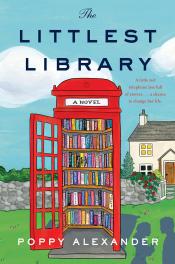
The Littlest Library by Poppy Alexander
A heartwarming literary-themed novel about a woman who turns an ordinary red phone box into the littlest library in England and brings together a struggling town.
A little red telephone box full of stories, a chance to change her life...
Jess Metcalf is perfectly content with her quiet, predictable life. But when her beloved grandmother passes away and she loses her job at the local library, Jess' life is turned upside down.
Determined to pick up the pieces, Jess decides it's time for a new beginning. Unable to part with her grandmother's cherished books, she packs them all up and moves to a tiny cottage in the English countryside. To her surprise, Jess discovers that she's now the owner of an old red phone box that was left on the property. Missing her job at the local library, Jess decides to give back to her new community--using her grandmother's collection to turn the ordinary phone box into the littlest library in England.
It's not long before the books are borrowed and begin to work their literary magic--bringing the villagers together... and managing to draw Jess' grumpy but handsome neighbor out of his shell.
Maybe it's finally time for Jess to follow her heart, let go of her old life, and make the village her home? But will she be able to take the leap?
Image
The Very Secret Society of Irregular Witches by Sangu Mandanna
A warm and uplifting novel about an isolated witch whose opportunity to embrace a quirky new family--and a new love--changes the course of her life.
As one of the few witches in Britain, Mika Moon knows she has to hide her magic, keep her head down, and stay away from other witches so their powers don't mingle and draw attention. And as an orphan who lost her parents at a young age and was raised by strangers, she's used to being alone and she follows the rules...with one exception: an online account, where she posts videos pretending to be a witch. She thinks no one will take it seriously.
But someone does. An unexpected message arrives, begging her to travel to the remote and mysterious Nowhere House to teach three young witches how to control their magic. It breaks all of the rules, but Mika goes anyway, and is immediately tangled up in the lives and secrets of not only her three charges, but also an absent archaeologist, a retired actor, two long-suffering caretakers, and...Jamie. The handsome and prickly librarian of Nowhere House would do anything to protect the children, and as far as he's concerned, a stranger like Mika is a threat. An irritatingly appealing threat.
As Mika begins to find her place at Nowhere House, the thought of belonging somewhere begins to feel like a real possibility. But magic isn't the only danger in the world, and when a threat comes knocking at their door, Mika will need to decide whether to risk everything to protect a found family she didn't know she was looking for....